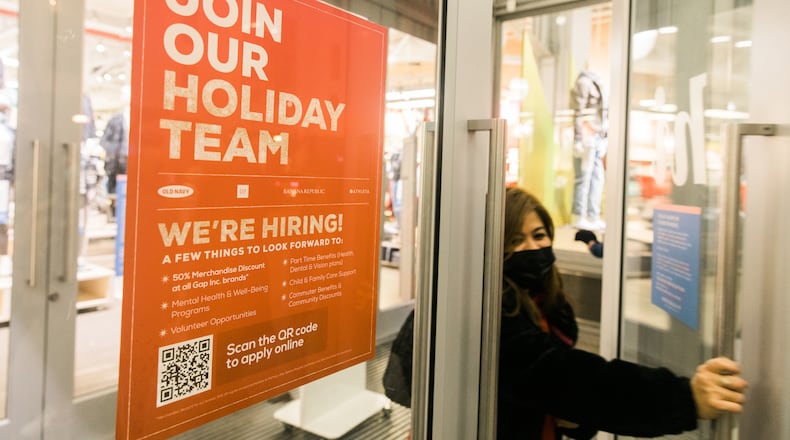Georgia saw heady employment growth last month, adding 21,000 jobs, one of the strongest Octobers on record.
An unprecedented number of people have been quitting jobs and jumping to new positions and industries in recent months as they search for better pay, higher purpose or more flexibility.
But the state’s monthly employment report Thursday also showed the overall economy continuing to churn back toward pre-pandemic health.
Georgia is about 60,900 jobs short of its level in February 2020, said Mark Butler, the state’s labor commissioner. “We have seen continuous job growth this year. We have gained back 90% of the jobs lost during the pandemic.”
Hiring was strongest in transportation, warehousing and retail last month as stores and logistic companies ramped up for the holidays. Yet it could have been even stronger: About 300,000 positions remained open across the state, while the number of Georgians looking for work declined, according to the state Department of Labor.
That is one reason the unemployment rate in October dipped to an all-time low of 3.1%: The rate counts only those actively seeking work.
Explanations abound for the number of people on the sidelines: many people depending on working spouses or living off savings, early retirements, returns to school.
The shortage of jobseekers has many companies offering various incentives. The average U.S. wage is up 4.5% over the past year, according to the Atlanta Federal Reserve.
At Batteries Plus in Canton, a new hire gets a $500 signing bonus and hourly pay into the “high teens,” said co-owner Eric Harris. The shop, which just opened, has filled three positions and has one open.
“It hasn’t been as easy as I wanted it to be,” he said. “It’s about finding the right employees. And the good people have choices.”
There’s an attitude shift among some jobseekers who know they are in demand, Harris said. “We talk with some candidates, we set up some meetings, and then the person doesn’t show up.”
The Department of Labor says some big companies have more than 1,000 jobs open in Georgia, including Amazon, Wellstar Health System, Home Depot, Beech Valley Solutions and Piedmont Health Care.
Yet small businesses historically do much of the heavy lifting. In a pre-pandemic study, the Small Business Administration calculated that smaller companies were responsible for 62% of the jobs created after the Great Recession.
Luis Carranza, chief financial officer at Atlanta-based CharterUP, said the company, which arranges shuttles and chartered buses, has grown dramatically, adding 20 of its 60 employees since early summer.
“I have noticed that people do come off the market pretty fast,” he said. “We’ll be about to make an offer and a guy will say, ‘Well, I’m going to work for Facebook.’”
Moreover, many people who have jobs are restless.
The share of Georgians quitting their jobs was at a record high in August. But the share of hires was close to a record high, too, and many people are apparently shifting industries. Some sectors have more employees now than before the pandemic but others — especially accommodation, food services and government — are struggling.
People who are tired of working in restaurants can make decent and dependable money killing bugs, said Quentin Misenheimer, managing director for field human resources at Atlanta-based Rollins, which owns a number of pest control companies, including Orkin.
Service technicians start at more than $40,000 and can expect to earn double that, even if the economy stalls, Misenheimer said. “Cockroaches don’t know there’s a global pandemic. Cockroaches don’t read The Wall Street Journal.”
Even people who aren’t switching fields are often interested in new arrangements.
After a contract job ended, Denise Rupert, 47, of Alpharetta, signed up with Airtasker, an Australian company that connects workers with short-term tasks. She’s an accountant and financial analyst, but she’s open to other chores like fetching shopping orders or picking up prescriptions.
“I’m not trying to replace a full-time job,” she said. “But my mindset has changed a lot during the pandemic. Particularly, it changed knowing how much we can do remotely. But the biggest thing for me is flexibility.”
Georgia economy, October
Jobs added in 2021: 21,000
Jobs added, average pre-pandemic: 4,600
Most added: 29,400 (1993)
Georgia labor market, since start of pandemic
Jobs: -60,900
People in labor force*: -31,420
Unemployment rate, Feb. 2020: 3.5%
Unemployment rate, Oct. 2021: 3.1%
*Either working or seeking work
Georgia economy, this year
Jobs added: 149,400
Sources: Georgia Department of Labor, Bureau of Labor Statistics
About the Author





